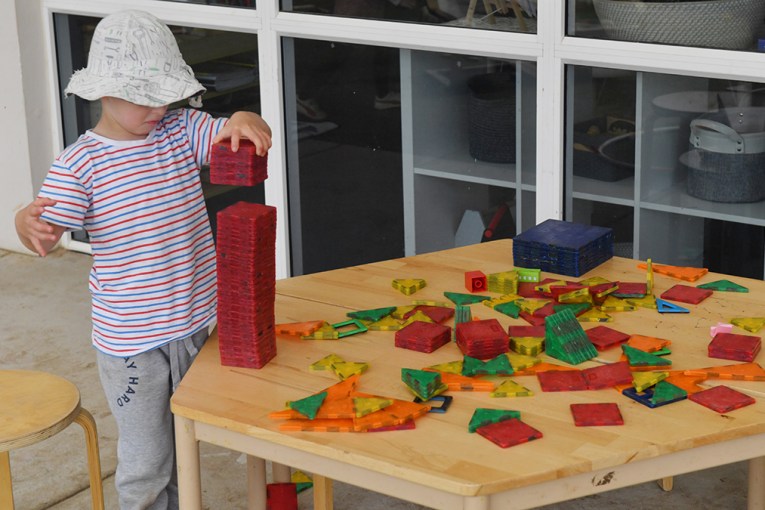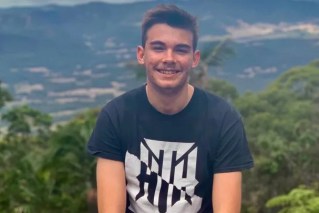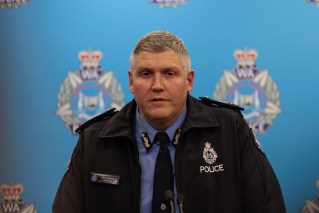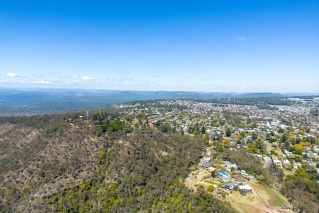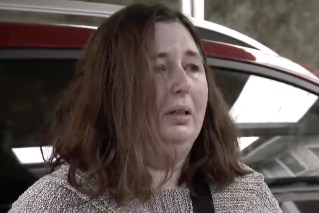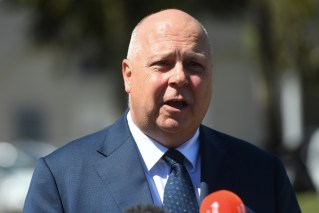Mobile testing vans lead suburban blitz as Victoria on ‘knife’s edge’

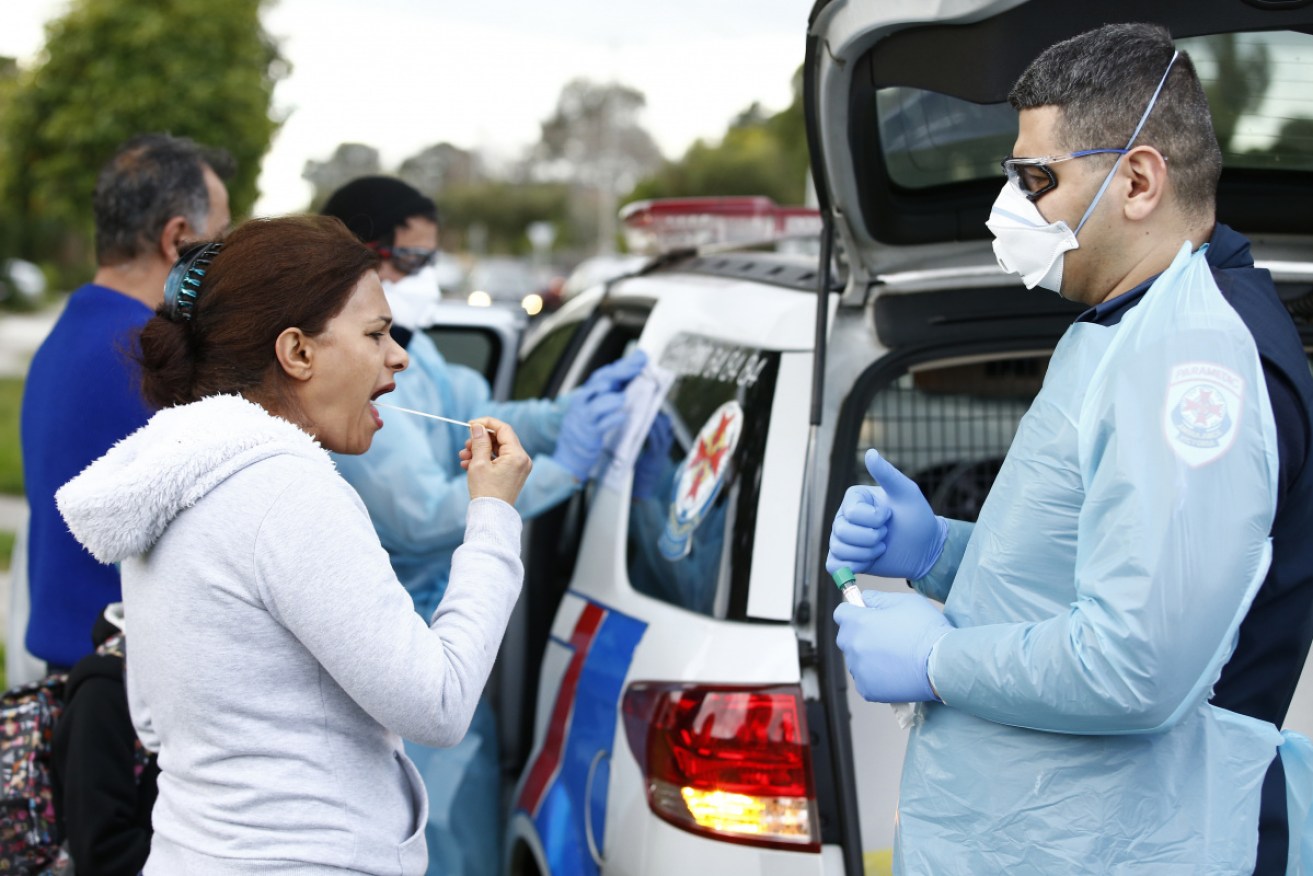
Paramedics perform COVID-19 tests in Broadmeadows on Thursday after doorknocking residents in the Melbourne suburb. Photo: AAP
A fleet of mobile testing vans will be deployed in a massive suburban blitz to contain a rising infection rate that has placed Victoria on a “knife’s edge”.
Victoria will ramp up virus testing to 25,000 a day, with the aim of reaching around half of residents in Melbourne’s 10 virus hotspots.
Premier Daniel Andrews said about 800 staff would hit suburban streets to zero-in on community transmissions and get a sense of how the virus was spreading.
While assuring Victorians the government did not want to reinstate lockdowns measures, Mr Andrews urged people to come forward for free testing, whether or not they had symptoms.
“See it as your civic duty. See it as your contribution to keeping your local area and our whole community safe,” he said.
Mr Andrews said the state was on a “knife’s edge” and “what we do now will determine what comes next”.
Mobile testing will focus on Keilor Downs, Broadmeadows, Maidstone, Albanvale, Sunshine West, Hallam, Brunswick West, Fawkner, Reservoir and Pakenham.
The existing 130 testing locations across Victoria will continue and from next week much faster saliva tests will be available, a first in Australia.
Victoria reported 33 new COVID-19 cases on Thursday and the government revised down its request for defence troops from 1000 personnel to 150.
The expansion of testing in Victoria comes as the World Health Organisation (WHO) raised alarm over a “resurgence” of the coronavirus in Europe as restrictions ease.
Although the spread is subsiding in Europe, WHO regional director Dr Hans Henri Kluge said weekly infections had risen for the first time in months.
“In several countries across Europe, this risk has now become a reality – 30 countries have seen increases in new cumulative cases over the past two weeks,” he said.
“In 11 of these countries, accelerated transmission has led to very significant resurgence that if left unchecked will push health systems to the brink once again.”
The USA is also on a worsening trajectory, with America’s three most populous states – Florida, Texas and California – setting new daily records.
Texas, in particular, is quickly becoming the USA’s new epicentre, CNN reports, and if current trajectories continue, the city of Houston could be one of the hardest hit in the USA with numbers on par with Brazil.
Florida has been reporting about 5000 new cases a day, similar to Texas, while California broke its own daily record with 7,000 cases.
‘Major incident’ declared as beach swamped

As temperatures hit 33 degrees, thousands of people crammed onto Bournemouth Beach in the south of England. Photo: AAP
Thousands of people flocking to a popular UK beach in a heatwave that reached 33 degrees have forced authorities to declare a “major incident”.
Visitors descended on Bournemouth, in southern England, causing gridlock on the roads, camping illegally, leaving excessive waste and engaging in anti-social behaviour and alcohol-fuelled fights, according to the council.
A major incident was declared, with the council citing the irresponsible behaviour of crowds who had ignored public health guidance on coronavirus and badly overstretched local services.
“We are absolutely appalled at the scenes witnessed on our beaches, particularly at Bournemouth and Sandbanks, in the last 24-48 hours,” said Council Leader Vikki Slade in a statement on Thursday.
“The irresponsible behaviour and actions of so many people is just shocking and our services are stretched to the absolute hilt trying to keep everyone safe.”
Bournemouth at lunchtime. It's not even the weekend yet! https://t.co/NrHJ5NvFmV
— Stan Collymore (@StanCollymore) June 25, 2020
The UK had 149 daily deaths on Thursday, reaching more than 43,000 to date.
Social distancing measures have been in place in Britain since March to slow the spread of the coronavirus, although the rules are due to be significantly relaxed from July 4.
With pubs still closed, many people have been heading to parks and beaches to meet friends and drink alcohol, in some cases ignoring advice to keep two metres apart.
In Bournemouth, roads were obstructed by illegal parking, crews were abused as they attempted to empty overflowing bins and 33 tonnes of waste had to be removed from the stretch of coastline in and around the town on Thursday morning.
Virus to stick around
An Australian Senate inquiry has been told the coronavirus will probably remain a problem for at least two years as winter makes it harder to curb the spread of the virus.
“We’re going to have to keep up the things that we know work, which is predominantly keeping a physical distance, washing your hands and people who are sick staying away from others,” Australian National University’s Professor Peter Collignon said on Thursday.
“Probably winter will be more risky, so I worry about the next three months in Australia in particular.”
Professor Raina MacIntyre, from the Kirby Institute for Infection and Immunity, says Australians should embrace face masks as strict restrictions ease – something veteran ABC broadcaster Norman Swan backed as compulsory on public transport – and suggested that planning begin for how a vaccine should be delivered and to whom.
Professor MacIntyre also warned that Victoria’s spike in cases could easily happen elsewhere.
“They have been exemplar with their response and it probably will happen in other parts of Australia,” Professor MacIntyre said.
“What we need is to work together across our differences to protect Australia.”
Australian Medical Association president Tony Bartone warned the nation is in the early stages of the fight against the virus, and encouraged senators to set up an Australian Centre of Disease Control.
The warnings came as Prime Minister Scott Morrison urged states to forge ahead with lifting restrictions despite the surge in coronavirus infections in Melbourne.
“We are dealing with the coronavirus, the COVID-19, better than almost any country in the world and that’s got to give us confidence to be able to move ahead,” Mr Morrison said.
Australia recorded 37 new cases on Thursday, 512 still active, with four new infections in NSW and 33 in Victoria.
The national death toll increased to 104, after an 85-year-old man who died in a NSW aged -care facility in April was reclassified as a COVID-19 victim.
-with AAP
